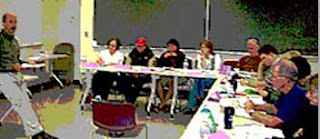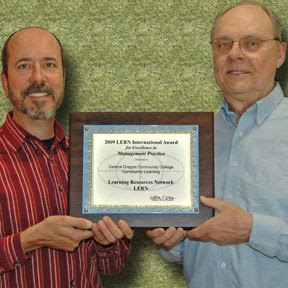The previous post gave an overview of social media and suggested some classroom uses. This post offers specific information on Facebook, its use by the department, and one of our instructor’s classroom application of a blog.
Facebook
A white paper titled, “Drive Belonging and Engagement in the Classroom” provides a closer look at Facebook from a classroom perspective. It discusses Facebook popularity, demographics, growth, etc. along with ideas on:
1. Creating a teacher or student biography (called a profile).
2. Creating student groups.
3. The sharing of photos and videos.
4. Publishing notes and classroom examples.
5. Management of assignments.
6. Testimonials of instructors.
View the document by clicking here.
Department Facebook Page
The department’s use of Facebook is just beginning. The idea behind the Facebook page is to establish a presence rather than being a social networking place. To view the department's page, you will need to join Facebook. It is easy, free, and safe. Join and view by clicking here.
Classroom Blog
A long-time department instructor has been operating a class blog for several years. He uses it to keep in touch with former students, provide current information, offer supplement material, etc. View the blog by clicking here.
Even More...
Want to know even more about social media? Enroll in the upcoming spring session of “Market your Business on Social Media”, April 14 and April 21 6-9 p.m.
Monday, January 26, 2009
Tuesday, January 20, 2009
Social Media in the Classroom, Part I
 Social media refers to the interaction of people using digital technology such as personal computers and mobile telephones. It is different from industrial media such as newspapers, television, films, etc., in that it is not one-way communication, not usually owned/operated by a large company, is low/no cost, etc.
Social media refers to the interaction of people using digital technology such as personal computers and mobile telephones. It is different from industrial media such as newspapers, television, films, etc., in that it is not one-way communication, not usually owned/operated by a large company, is low/no cost, etc.The communication segment of social media encompasses blogs, social networking, and micro-blogging (text messaging), all of which have many classroom uses. For example, one can create a presence where students can interact on a personal level, discuss classroom activities, and exchange drafts of written papers for peer review. For the instructor, it is a means to post supplemental material, maintain contact with students once the course has concluded, and promote enrollment in other classes.
The following social media communication sites are examples of what is available. Each offers a free service.
Blogging
Blogger.com No advertisements on pages.
Wordpress.com Placement of advertisements on the page.
Networking
Facebook.com Originally for those of college age.
Myspace.com Originally for those of pre-college age.
Linkedin.com Professional-oriented.
Ning.com Offers software to create an online community.
Micro-blogging
Twitter.com Text-message blogging of no more than 140 characters.
Next week we will look at specific examples of social media in the classroom.
Labels:
advertising,
blog,
Class promotion,
social media,
twitter
Monday, January 12, 2009
Putting Community Learning into a Context

Ever wonder what you are doing by teaching a class? Is it just that: teaching a class? Is there a larger picture?
When viewed in a larger context, the class you offer is a vital component of an organic whole. It is possible to attain a sense of how your class fits into the scheme of things by viewing a PowerPoint presentation.
The slide show was created by Augusoft.com and is titled, “A New Day is Dawning: The State of Community Education & Lifelong Learning.” The term ‘community education’ is very much the same as what we call ‘community learning’ here at COCC.
Take a look at the show by clicking here.
Monday, January 5, 2009
Community Learning Instructor Blog Celebrates One Year Anniversary, Receives International Award
The department blog, developed by Tom McDannold and Paul Stennett, has been on the Internet for one year. With the participation of department instructors and staff, it has received international recognition as summarized in the following media release.

Central Oregon Community College Community Learning has been honored for excellence in the Management Practice category by the Learning Resources Network (LERN), an international association in lifelong learning. The winning entry was included in a showcase of internationally exemplary programs at the LERN Annual Convention in San Francisco, California on November 16 to 18, 2008. The winning entry was submitted by Beth Wickham. Information about the submission was on display in the conference Hall of Learning throughout the three-day conference. In addition, the winning programs will be featured in future LERN publications and on LERN’s website.
Judges indicated that there was a very high level of excellence in this year’s field of nominees. Julie Coates, Vice President of Information Services for LERN, said that this year’s award nominees were among the highest quality ever submitted. Ms. Coates also noted that there were more winners selected this year than in any previous year, due to the excellence in quality of the nominations.
In selecting programs to be recognized for excellence, Coates said the primary criteria judges used for those selected was the quality of being at the leading edge of the field of lifelong learning, as evidenced by their nomination. In addition, judges also applied the following criteria: originality, innovation, appropriateness as a model for other programs, replicability, and measurable outcomes. The awards selection process is very competitive, Coates, said, and it is truly an honor to be selected. Central Oregon Community College Community Learning entry was selected from more than 140 nominations from four countries.
A special thanks is extended to all those who read the blog during its first year (well over 3000), offered comments, provided posts, and particularly Beth Wickham who made the nomination for the award.
We encourage our readers to send us comments, ideas for articles, and even complete submissions. Please click on Comments and share your thinking.

Central Oregon Community College Community Learning has been honored for excellence in the Management Practice category by the Learning Resources Network (LERN), an international association in lifelong learning. The winning entry was included in a showcase of internationally exemplary programs at the LERN Annual Convention in San Francisco, California on November 16 to 18, 2008. The winning entry was submitted by Beth Wickham. Information about the submission was on display in the conference Hall of Learning throughout the three-day conference. In addition, the winning programs will be featured in future LERN publications and on LERN’s website.
Judges indicated that there was a very high level of excellence in this year’s field of nominees. Julie Coates, Vice President of Information Services for LERN, said that this year’s award nominees were among the highest quality ever submitted. Ms. Coates also noted that there were more winners selected this year than in any previous year, due to the excellence in quality of the nominations.
In selecting programs to be recognized for excellence, Coates said the primary criteria judges used for those selected was the quality of being at the leading edge of the field of lifelong learning, as evidenced by their nomination. In addition, judges also applied the following criteria: originality, innovation, appropriateness as a model for other programs, replicability, and measurable outcomes. The awards selection process is very competitive, Coates, said, and it is truly an honor to be selected. Central Oregon Community College Community Learning entry was selected from more than 140 nominations from four countries.
A special thanks is extended to all those who read the blog during its first year (well over 3000), offered comments, provided posts, and particularly Beth Wickham who made the nomination for the award.
We encourage our readers to send us comments, ideas for articles, and even complete submissions. Please click on Comments and share your thinking.
Subscribe to:
Comments (Atom)
